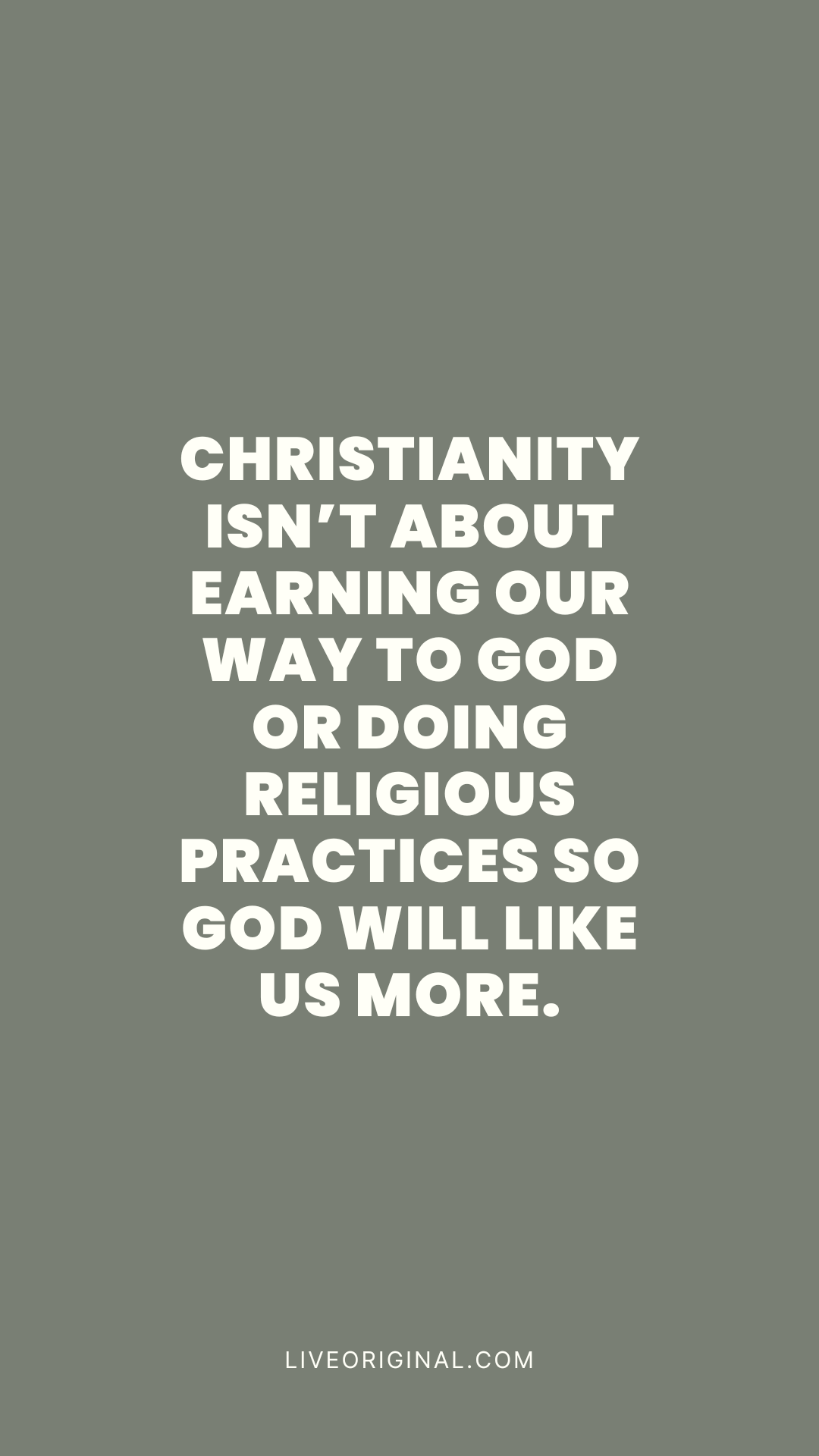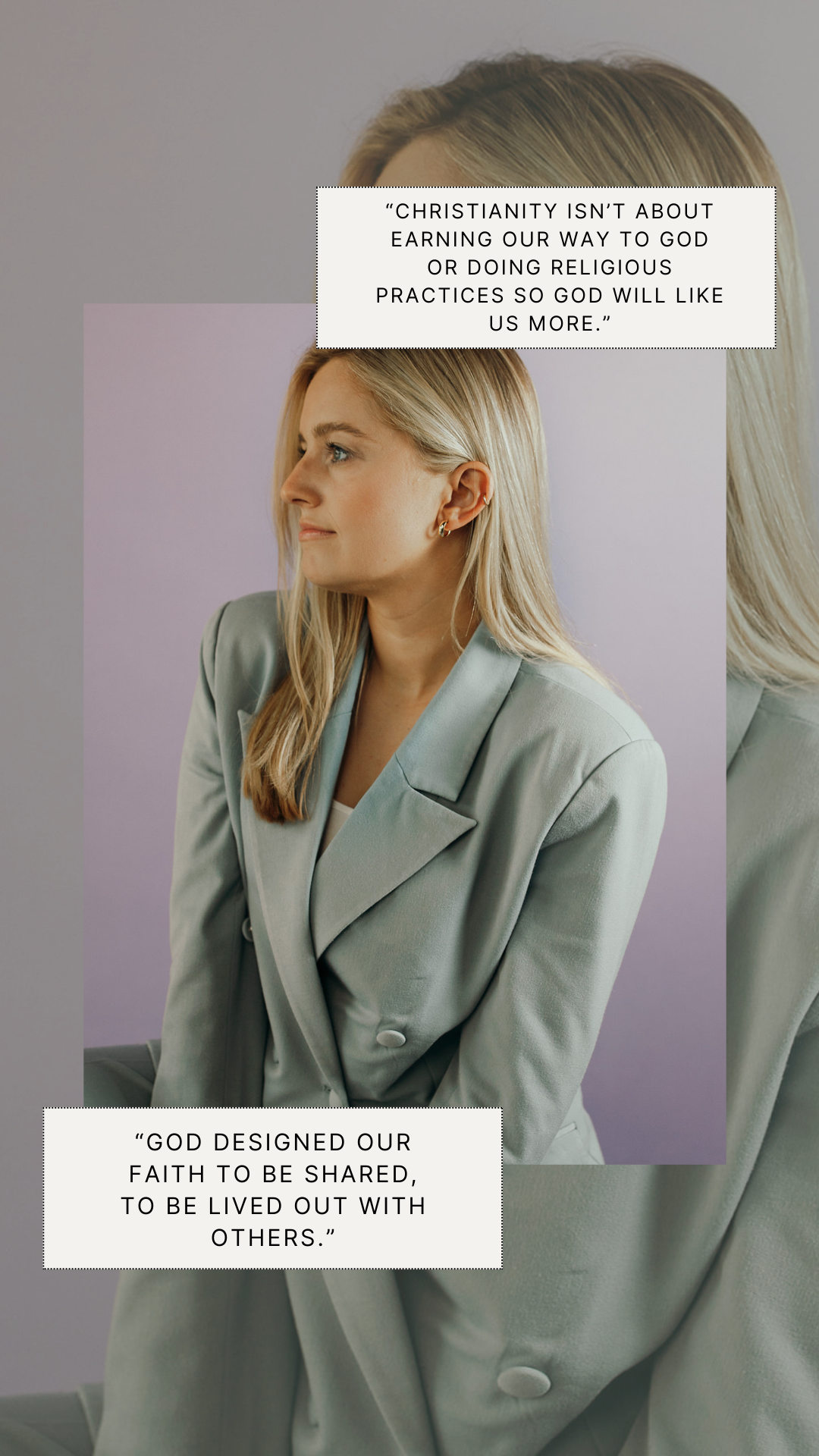If you’re local to Dallas, Texas, on November 17th at 7:30 PM we’re hosting an LO Local event – it’s all about rethinking what it means to follow Jesus and realizing that we’re not meant to do it alone. We’ll be talking all about Emma Mae’s Workshop from the LO Sister App, worshipping together, hanging out, eating snacks, and opening the Word. No RSVP required and this event is totally free!
Let’s start with a familiar picture: you’re new in town, maybe it’s freshman year of college, a new job, or a new stage of life. You’re sitting in your car, wondering why you feel so isolated. No close friends nearby, no local church to lean on, and you’re scrolling through Instagram or TikTok where everyone else seems to have it all figured out. Maybe you’re going through the motions, trying to keep up, but the connection just isn’t there. We’ve all been there—or somewhere close.
Here’s another scenario. Think about group projects. Most of us have had that one project we ended up doing mostly (if not entirely) by ourselves—we stayed up super late, put in all the work, and found ourselves frustrated and exhausted. And here’s what’s interesting—Faith can feel that way, too, especially when it seems like no one else is there to share the load, check in, follow up, or care about how you’re actually doing.
But the truth can change everything: God designed our faith to be shared, to be lived out with others.
I know what it’s like to be surrounded by people (even Christian friends) and feel totally alone. It can seem like everyone else is living a picture-perfect life, filled with friends and moments of strong faith, but when we’re alone, it’s a different story. Trying to follow Jesus while feeling isolated can make faith itself feel disorienting or even discouraging.
But if you’re feeling this way, here’s the good news: God never meant for us to do faith alone. Following Jesus was always meant to be a group project.
There’s no better place to see this “group project” approach than in Acts 2:42-47, where we get a glimpse into the very first church community. It’s where we find the beauty of what a life together, in Jesus, can look like. We get a snapshot of the first church in Jerusalem—a close-knit community that grew rapidly after the Holy Spirit came, and people began turning to Christ. But here’s something unique about the church: it wasn’t simply a building; it was a family. And it should still be the same today.
People believed in Jesus individually, yes, but they lived it out collectively, forming the very first local church (and no, this family didn’t all live in one house. They lived all over the city, came together, and met in homes). And it wasn’t exactly a popular move—the religious culture in Jerusalem was skeptical, even hostile. Yet these early believers kept showing up for each other, creating a community that looked totally different from anything else around. The church was never just a building (like we often say, “Are you going to church this Sunday?”). The church is a group of people who do life together. Here are three distinct markers of this first church community in Jerusalem:
- They Centered on the Word & Worship
“All the believers devoted themselves to the apostles’ teaching, and to fellowship, and to sharing in meals (including the Lord’s Supper), and to prayer. A deep sense of awe came over them all, and the apostles performed many miraculous signs and wonders.”- Acts 2:42-43
The early church prioritized gathering around the teachings of Jesus, prayer, and the Lord’s Supper. The church community was devoted. This wasn’t just an occasional gathering; it was the pattern of their lives. They listened to the apostles (their leaders) who shared what Jesus had taught, and they experienced God’s presence in community, which led to a collective sense of awe and worship.
Through this togetherness, God moved powerfully among them. Wouldn’t it be nice if you could say that you were tangibly seeing God move in power? Being plugged into a local church doesn’t mean you will 100% for sure see God move, but it does mean you can be confident you’re doing something that’s in line with His design and will for believers. God’s model for Christianity, from the very beginning of its existence, involved Christians gathering together in the context of local Churches (local groups of believers) opening His Word and being amazed as He moved. So, it’s worth asking ourselves: Who are we listening to, and are those voices drawing us closer to God? Who do we surround ourselves with, and are they building up our faith?
As the early church gathered, they’d share communion. Jesus first taught about communion during the Last Supper, which He shared with His disciples just before He was arrested. Communion (also called the Lord’s Supper) is a way for His followers to remember His love and sacrifice. During the Last Supper, Jesus took some bread, broke it, and told His disciples, “This is my body, which is given for you; do this in remembrance of me” (Luke 22:19). Then He took a cup of wine and said, “This cup is the new covenant in my blood, which is poured out for you” (Luke 22:20). These simple things—bread and wine—became symbols to help us remember the huge sacrifice Jesus was about to make on the cross. He wanted His followers to use this meal to remember what He did for us and to reflect on His incredible love.
Jesus might’ve used bread and wine because they are easy to find and share, but they also have special meaning. The bread stands for Jesus’ body that was broken for us, and the wine stands for His blood, which was shed for the forgiveness of our sins. When we take communion, we remember His love and sacrifice and the new relationship (or covenant) that we have with God because of Jesus. Really, communion is a reminder of the gospel, that God loved us so much He sent His one and only son to die on the cross, taking the punishment we deserve for our sins. He rose again, defeating death, so that those who believe in Him can have life and life to the full (Romans 10:9-10).
Christianity isn’t about earning our way to God or doing religious practices so God will like us more. We could never and will never measure up (Ephesians 2:8-9). Even on our “best” days we fall short. We’re saved by our faith, not our works or performance. But, if you’re a Christian, God isn’t holding your sinful choices against you. The picture communion calls to mind, of Jesus on the cross, is the ultimate example of forgiveness. Jesus forgave us for our sins. We don’t have to measure up. No one can.
Today, it can be easy to live with an “it’s just me and Jesus” mentality. And I get it, maybe you’ve been hurt. Or hurt by someone in the Church—the other people in the church can’t measure up to God’s perfect standard either. So first, I just want to say, if that’s you, I’m so sorry that you’ve been hurt, seemingly by the church. It’s painful when a place that’s supposed to feel safe, accepting, and loving ends up causing hurt instead. You’re not alone in feeling this way. So many people have gone through similar experiences, and it’s completely understandable to feel confused, sad, or even distant from church because of it.
But please know, the heart of Jesus is gentle, kind, and never condemning. People aren’t perfect, even in church, but that doesn’t change how much God loves you and wants you to experience real community. Healing takes time, but God’s desire for you is forgiveness and healing. So as you process and heal, try to lean on other believers who bring you peace and encouragement. You might be tempted to “throw the baby out with the bathwater,” as the saying goes—to throw out all churches after being burned by one or two, maybe even three. If that’s you, spend some time journaling your thoughts, hurts, and worries in a prayer to the Lord. Ask Him to give you the courage to forgive and then to either seek reconciliation with those who hurt you or pursue a new local church. I’m praying He’ll guide you in this decision.
Let’s get back to the early church in Acts.
- They Practiced Radical Sharing & Caring
“And all the believers met together in one place and shared everything they had. They sold their property and possessions and shared the money with those in need.” – Acts 2:44-45
In a world where resources can feel scarce and the focus can often be self-centered, these believers practiced radical generosity. They didn’t isolate themselves (solely sitting with Jesus in a coffee shop) or protect their possessions (storing up journals and Bible studies that collected dust on their shelves); instead, they shared what they had so no one went without. This wasn’t a token gesture but a commitment to real, practical care. It showed they understood community isn’t just a concept; it’s a practice that comes to life in how we show up for each other.
Imagine what it would look like if all the girls in your dorm who knew Jesus freely shared their clothes or notes from class. What would the non-Christians think? Or maybe you’re like me, and you’re not in undergrad anymore. You’re a working professional? What might radical generosity look like with your neighbors or community group? Ask yourself: Are you trying to do life alone, or are you finding ways to connect with those in your church, offering and receiving support?
Now these are good examples to get those wheels turning, to get some ideas going. But don’t miss this—the early Christians were practicing this radical generosity in the context of a local church. You see, while a group of believers (who aren’t from the same church) can come together and do some amazing things (like fund Bible translation, raise school supplies for a needy community, or donate clothes to a women’s shelter), the kind of generosity we’re reading about in Acts 2 was different. Their generosity was centered around the local believers (who were part of the same congregation) caring for each other.
Local churches provide us with levels of care. Through the local church we experience the teaching of the Word (catered to believers in the same shared cultural context – not a podcast streamed from across the country to a different audience). In the local church we get to be shepherded by church leaders who help us grow in Christlikeness and we get to be encouraged by our local brothers and sisters in Christ! And that’s just a few examples in addition to those described in Acts 2.
- They Created a Habit of Hanging Out
“They worshiped together at the Temple each day, met in homes for the Lord’s Supper, and shared their meals with great joy and generosity—all the while praising God and enjoying the goodwill of all the people. And each day the Lord added to their fellowship those who were being saved.” – Acts 2:46-47
The first church wasn’t just meeting once a week; they had a habit of being together. Every day, they worshiped in the Temple, gathered in homes, and shared meals. This wasn’t a compartmentalized faith—it was an all-day, everyday kind of thing. Today, many Christians are tempted to turn their faith on or off depending on the day of the week—it’s easy to turn up the volume of our faith on Sundays when we’re going to Church. But for the early church? The joy, generosity, and authenticity of their lives together was something others couldn’t ignore. People around them noticed and were drawn in by the way these Christians lived, curious to know what made them different. And every day, more people joined them, finding faith in Jesus. Reflect on this: When others look at your life and your community, do they see something that points them to Jesus? Are they drawn in by the way you live out your faith?
The early church gives us a model: We’re meant to follow Jesus together. Being a believer (among other traits) means being marked by three things: centering on the Word and worship (gathering with a local church body), sharing and caring for each other, and practicing the joyful habit of spending time together. This way of life wasn’t just a one-time experiment for the early church—it was foundational. And it still is for us today.
God designed us to need each other. He created the church as a family where we can grow, lean on each other, and live out our faith together. Following Jesus is a group project, and when we live that way, we show the world a glimpse of His love and grace.
If you’re a Dallas, local, we’d love to invite you to Join us for the LO Local event on Sunday, November 17th at 7PM at Watermark Coffee. You can come alone, and ready to make some new friends, or bring your besties. Either way, we want to help you experience biblical community (and have some fun). See you there!














0 Comments